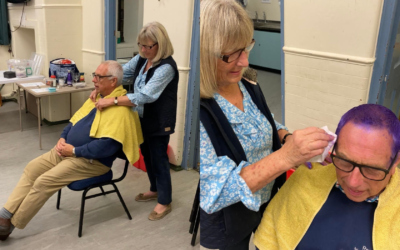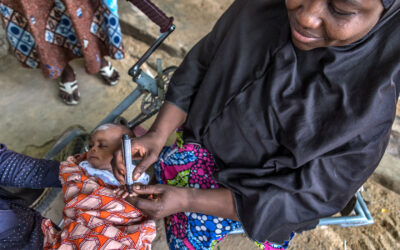The World Health Organization’s lead in the fight against polio has warned that Rotary must not allow efforts to falter in the final lap of wiping the disease off the face of the earth.
Michel Zaffran, Director of Polio Eradication, helped to launch the Polio Endgame Strategy in London last night, which is ambitiously looking to secure $3.27 billion funding over the next four years.
Rotary will be at the forefront of that fundraising for an initiative which seeks, by 2023, to “reach every last child for a polio-free world”.
Speaking at the Houses of Parliament, the Swiss-based expert pointed out that, globally, the number of children who have contracted polio since 1988 has decreased by 99.9%.
Just two countries, Afghanistan and Pakistan, are currently confirming cases of endemic polio, he said.
The bold four-year strategy focuses on eradication, integration, certification and containment.
And it outlines how the Global Polio Eradication Initiative, which Rotary is part of, will stop transmission of the wild poliovirus in these countries while sustaining the polio-free status of other nations which remain at risk.
Thank you @AWMurrison for meeting with @RotaryEndPolio and our colleagues @UNICEFpolio and @michelzaffran to discuss our continued and joint efforts to rid the world of polio. Together we can #EndPolio forever. @EndPolioNow https://t.co/2SR4p8iSEw
— Rotary GB & Ireland (@RotaryGBI) July 2, 2019
With Nigeria close to becoming the latest country to have gone three years without a reported case, Michel Zaffran revealed that $127 billion has been invested in the fight against polio since 1988.
“Can we afford that to go to waste?” he asked a Westminster gathering of Rotarians, MPs, health workers and academics, as well as representatives from the Pakistan and Afghanistan embassies.
“We have vaccinated millions of children around the world and a lot of money has been invested. Are we going to stop now when we are so close to delivering a world without polio?
“If we stop now, we run the risk of going backwards and wasting investment. We need to avoid going backwards when we are so close to the finish line.”
The rewards of victory are huge, explained Michel Zaffran. He predicted polio’s elimination would worldwide generate a further $14 billion in health care savings, on top of the $25 billion already made.
Not only is the global polio effort working in countries yet to be rid of the virus, but efforts were ongoing in up to 60 countries, he reported, to ensure polio does not return. This requires vaccinating around 400 million children.
“The world will save much more money by eradicating the disease,” he added. “And this is why we need international support.”
We need to avoid going backwards when we are so close to the finish line.”
The launch event heard from UNICEF’s Akhil Ilyer and Aziz Memon, Chair of the National Polio Committee in Pakistan, who both described in detail the challenges faced by vaccinators in the face of huge geographical and cultural challenges.
Aziz revealed their renewed strategy to complete the job in Pakistan was focused on winning the hearts and minds of communities, particularly among religious leaders.
“We hope some sense will prevail, so that those vaccinators, who are doing such a noble cause, will one day save my children and grandchildren from this crippling disease,” he said.
Five Pakistan vaccinators were killed by gunmen in May where hardline clerics and militants have raised suspicions about the purpose of the vaccinations. And Akhil Ilyer paid tribute to the “thousands of heroine vaccinators” who faced suspicion and threats in Pakistan.
Judith Diment, a member of Rotary International’s PolioPlus Committee, pointed out that 18 million children had been saved through the Global Polio Eradication Initiative.
In 2019, the wild poliovirus case count has reached 37 cases in Afghanistan and Pakistan, which is higher than the total number of cases in 2018.
It is crucial that we remain optimistic about the future and continue raising the funds and awareness necessary to support an end to this disease.”
In a separate statement, John Hewko, General Secretary of Rotary International, said it was important to gain perspective with how far the world has come since PolioPlus was begun in 1985.
“We’ve had less than 100 cases per year in the last four years, and the final cases are in small number of geographic areas,” he said.
“While we’ve experienced challenges in Pakistan and Afghanistan, we’re seeing progress in other important areas.
“Nigeria has not reported a wild poliovirus in over three years, and the Africa region could soon announce the certification of the eradication of the wild poliovirus.
“We are using innovative techniques to reach more children than ever before in some of the hardest-to-reach areas of the world, and our surveillance systems are continually becoming more sophisticated.”
John Hewko said that until the last case of polio has been cleared, children had to continue to be immunised, and Rotary, with its 1.2 million members, had to be integral to that effort.
He added: “We can’t get frustrated or slow our efforts. Instead, we need to double down on the promise we made over 30 years ago: to ensure that no child ever has to suffer the paralysing effects of polio.
“It is crucial that we remain optimistic about the future and continue raising the funds and awareness necessary to support an end to this disease.”
Thanks, @DFID_UK, for being a key partner in efforts to #endpolio. Thanks to the #UKAid:
– Protect 60 000 children/yr. from paralysis
– Will save £2 billion by 2035
Hoping for continued support in November at the GPEI pledging moment hosted by the UAE & @MohamedBinZayed. pic.twitter.com/Ejpduud6Vr— Michel Zaffran (@michelzaffran) July 2, 2019
In London, when asked whether he believed polio could be completely eradicated, the World Health Organization’s Michel Zaffran responded that he was confident.
He pointed out that of the three types of poliovirus, only type 1 continues to affect children. Type 2 is certified eradicated, and there hasn’t been a type 3 virus identified since 2012.
Michel also pointed to India, which has remained polio-free for eight years. “It is not a question of if, it is a question of when we will do it, and I am confident of that,” he responded.










